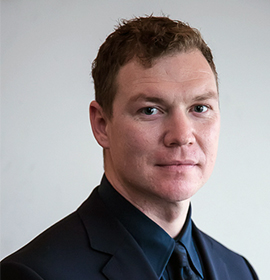The creative ecosystem
15 October 2020

Our 2020 Festival Review closes with an article by Festival Director Jaco Marais. At the heart of Jaco’s article is his personal account of growing up in South Africa as the country sought ways to move beyond the years of apartheid to become the rainbow nation imagined by Nelson Mandela.
In the following excerpt, Jaco offers his personal take on how to build effective creative teams, taking lessons from those milestone years in South Africa’s history.
Creative governance
At GGI we support NHS and other public or third-sector boards to reimagine systems to make them more resilient.
Governance is sometimes seen as the preserve of the system thinkers and process specialists – and there’s no doubt that process is the engine of governance. But challenges of this magnitude also call for creativity, flexibility and an element of play.
In my mind, creative solutions blend the skills and attributes of three distinct functions that make up a creative ecosystem. We can consider them as three types of people or, as President Mandela did, three elements of change.
- The visionary – e.g. Nelson Mandela – who sees things in a different way, plays with ideas, imagines a future idealistically while reaching for the sky; everything is limitless and they inspire others while perhaps occasionally coming across as a little foolish.
- The system thinker – e.g. Professor Mervyn King – who holds everything together with processes and project meetings, providing historical context and keeping the vision rooted in finance, legality and the art of the possible. Pure system thinkers serve a necessary function but can sometimes be seen as killjoys.
- The builder – e.g. Michelangelo – those who can create; they have the skills to translate the vision into reality. They are only limited by their skillset, materials, time and tools available to them. Builders or creators can struggle to stay on track unless they can see a clear outcome.
Whether you are rebuilding a nation, reconfiguring systems in the wake of a pandemic, or running a creative commercial project, when these three elements work together rather than fighting each other, the results are much more likely to deliver a sustainable solution.
But when there is conflict, everything slows down and becomes complicated, fractious and in need of yet another reorganisation before long.
Review and renew
As nature perpetually renews, so does the creative process.
These three elements can be put into a continuous cycle of imagine, review, create and renew, designing solutions with built-in perpetuating energy, each building on the previous cycle of renewal. Some people specialise in one area, while others can switch between two or all three.
Visionaries think, discuss and play with ideas freely without limits before the ideas are reviewed when considering the finances, regulators, political environment, people, systems and processes where these ideas will grow.
It might look like a breakdown of the original vision to fit a real-life situation, but this is a necessary part of the process as people who create or build need doable tasks if anything is to be sustainably achieved.
By constantly reviewing progress, changes are kept manageable. New problems are identified and creative solutions can be found, fixed or built on. In this method, the ecosystem builds on past successes and an organisation can genuinely grow and refresh when the time is right in a constant cycle of renewal.
Small changes can make big transformations stick, especially when the people involved are part of their design and implementation each step of the way.
“People are usually afraid of change because they fear the unknown. But the single greatest constant of history is that everything changes.” Yuval Noah Harari, Homo Deus: A History of Tomorrow
This process lies at the heart of good governance and it is the job of a consultant to bring together diverse perspectives, sequencing them and then measuring and benchmarking progress continually.
This vital interplay between those who imagine, those who understand processes and systems and those who know how to get things done never ends. The creative process is a non-linear journey that begins with a spark, then many problems must be highlighted and solved in collaboration with those who are tasked to get things done.
Rewind – 100 bulletins in 100 days
Since the UK lockdown began, GGI pooled its resources to provide practical advice to boards of NHS and other public or third sector boards to help steer them through the many changes. From 23 March 2020, GGI published 100 bulletins in 100 days.
I was very happy to coordinate our collective thinking during this busy period. I took responsibility for the voice of GGI as interim communications director. Stephen McCulloch has now stepped into this role. Inspiring people is a serious business.
Our bulletins spanned a range of topics and styles. They covered everything from virtual meeting mechanics to strategies for the beleaguered performing arts sector, from environmental recovery to the importance of kindness. The total word count was roughly 90,000, the same as J.R.R Tolkien’s The Hobbit.
The bulletins are unattributed, because very few of them can be. Every member of the GGI team was involved in writing at least one of them. The Seacole Group and attendees of our weekly webinars for NHS non-executive directors, chairs of mental health trusts, and north-west NHS chairs, provide up-to-the- minute context while lawyers, public finance experts, digital providers as well as property specialists ensured the validity of our advice.
The GGI advisory service was made free and together with a skilled communications team that includes journalists, designers, videographers, project managers, technicians and social media analysts, we delivered, every day, on time.
It’s this same spirit of collaboration that made our first virtual festival of governance such a success. A big GGI thank you to everyone involved

